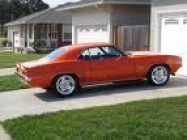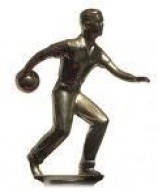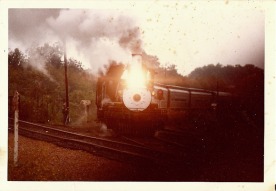
Arlyn West lives in Colorado and makes her living as a computer programmer. She writes in her spare time when she's not riding horses.
 Doris was a sourpuss. That’s what her husband said as he was walking out the door that last time rushing to his new girlfriend waiting in his classic fluorescent orange 1969 Camaro. Let her have his sorry geriatric ass, Doris thought. What did that twenty-two year old see in him anyway? The paunch, the balding hairline masqueraded by a comb-over, fooling no one. He was pathetic and Doris was glad to be rid of him. All she wanted was his money. But he got the better lawyer and kept it all. Doris pawned her diamond ring and got a tattoo.
Arlyn West lives in Colorado and makes her living as a computer programmer. She writes in her spare time when she's not riding horses.
4 Comments
 I just wanted to be like you, Jo. I didn’t have any good to take; just the taunting, the flat chest, the skinny freckled legs.
On Saturdays I’d ride my bike to Lake Lorraine. I’d swim away from the shore until the water dropped five degrees as the depth took hold. The small fish stayed by the beach, content with French fries and laughter. I’d swim all the way out to the high dive, where only the boys and the older girls would go. “Here comes the tomboy,” they’d call, or sometimes, “Look, it’s the mailman’s daughter!” I would pretend their words were for someone else. I was always good at pretending. The taunts, the snickers, the friendlessness didn’t bother me. I was alone, Jo. Weren’t you alone? At the reunion a sticky blonde said that I used to glow. She said her name was—Emma? Bethany? Blair?—and that she was at the lake sometimes and always saw an aura around me. She said at school I used to float through the cafeteria, untouched and unnerved. All I could do while she spoke was stare at her panty-hose and count how many times in my life I’d actually worn a dress. I think I got to four. When she finally walked away from her silent conversationalist, I saw it. On her shimmering satin back appeared a beanstalk girl on the high dive. You cannot see it, but she is very afraid. The girl floats up into the air, her eyes closed, and a shimmering light encompasses her. She pivots and heads back down and enters the water in a straight, foamless line. My God, she is beautiful. What you cannot see is that under the water she has lost her breath. You cannot see that she is afraid, and begins to flail, fighting to surface with all her might. J.M. Cinq-Mars lives in Massachusetts and writes on the moon. She is annoyed by her word processor’s habit of underlining the ‘Cinq’ in her last name. She once drove for a year with an expired license, which was kindly pointed out to her by a state trooper. Her court appearance is in May.  Her husband arrived home with thirteen bagels and two rounds of cream cheese. What did they need with all that? she asked. The bagel-schmear combo was on sale, he said, in a grab-n-go box.
Of the thirteen bagels, only two were the whole-wheat sesame she favored. He ate only plain. That left eight bagels in various flavors not to their liking. He placed the remaining bagels in the freezer. Go ahead, she drawled, tastes do change. Before he dressed his bagel, he spat onto the kitchen counter, wiped at the dried jam stain. She turned away and pushed her three fingers through the hole in her bagel, tried to force her thumb and pinkie inside. The bagel ripped. That evening, they walked to the neighborhood Chinese for dinner. It was always about food, she thought. She linked her purse, navy as the sky. Two girls in their late teens walked in front, working that ragged, all-black, waif look. One wore mismatched earrings: a large silver hoop in one lobe, and in the other a black plastic hoop that encircled a crow. The crow’s glass blue eyes glittered. She had never worn mismatched earrings. It suddenly seemed a critical mistake. The restaurant hostess wore jade-green contact lenses. The wife felt a pang, wanted to change her eye color. The hostess didn’t have a table available until ten-thirty. The couple couldn’t stay awake past nine o’clock. Not even for two? her husband pressed. His wife gritted her teeth. As they exited, the bell over the door tinkled. Outside on the sidewalk, the husband chuckled, said at first he’d thought the hostess said “talk dirty.” Time was his wife would have laughed. He added, “Did you see her eyes?” She didn’t care about dinner, still full from the bagels. The dig appeared lost on her husband. He couldn’t go without dinner. They returned home for the car. On the drive into town, they passed the new housing construction. Eight houses in the first development, but more would soon follow, eat into the wide green spaces. Something huge and dark shot out from the woods and into the road. The car swerved, but still they side-swiped the animal. The husband hurried from the vehicle. She followed. They stared down at the enormous elephant they had felled, disbelieving. The car had gouged the elephant’s hind leg, slick red blood trickled its dull crevices. The injured elephant raised its head, roared its hurt and outrage. The husband ordered her back inside the vehicle, afraid the elephant might recover, charge. He jabbered about the circus in town, the emergency phone further down the highway. He rubbed his bald pate. “Unbelievable.” She looked deep into the elephant’s pain-filled eyes. “I’m sorry.” Her husband patted the top of her arm. “Shush, now. It wasn’t your fault, dear.” “I’m sorry,” she said again, waiting for her husband to see that she was looking straight at him. Ethel Rohan has published widely, and is excited to have work forthcoming soon from DecomP, Necessary Fiction, and Potomac Review. She blogs at ethelrohan.com  The baby keeps trying to rip its eyes out.
“It’s like a crack baby going through withdrawals,” I say. “When have you ever even seen a crack baby?” Sheila’s mom asks, her face a mash up of Queen Elizabeth and the guts of a Honey Bucket. “I haven’t. I’m just saying.” “Well, don’t. Just shut. Your. Pie Hole. For once. ” . *** The baby is nearly a toddler now. He teethes on our cat’s metal water dish. Aspirins are his favorite candy. In the growing process he’s sprouted extra appendages. With his third thumb, he gouges a neighbor kid’s eye out. The next week he kicks a girl from a jungle gym. Then he mows down another with his trike. When I try to speak to him using my adult voice, he gurgles and grins. Sheila blames me. She says these are the kinds of things that happen when you have a predilection for violent cinema, when you expose an infant to movie fare such as “Scarface” and “Reservoir Dogs.” *** Sheila and I have been split for a few years. We loathe each other, yet appear friendly. That doesn’t matter. The kid is a bug collector. His favorite part is stabbing them through the thorax with a stickpin. Later he moves onto bigger things—rodents and strays, then runaways. Most mornings I wake to my son’s banshee shrieking, yet I never check on him anymore because I did that once. *** He brings his girlfriend by. She’s a blistered bowl of a girl, pale and plump yet subliminally vicious. He watches to see if I’ll be fooled. Asps are woven into the seams of her neck fat. She cups a curling iron in her palm. On the way out, she stabs me in the chest and makes for my groin but pulls back at the last minute. “Yo, Gramps,” she says, “reflexes need work.” DEVILS GIRL is tattooed across her fingers. *** Now the kid is just about a man. Girlfriend’s gone. He’s all business, is part of a gang, actually runs the show. He picks me up in a low slung Pontiac Catalina. “Get in,” he tells me. Two grease balls in the back shift in their seats. One of them has a cord wrapped so tight around his wrist that the skin is sour milk white. The other has two sets of brass knuckles. I have a bad feeling about this. I’m thinking Luca Brasi treatment here, straight out of “The Godfather,” the old stab and strangle trick with some fists thrown in for good measure. “Son,” I say, but he holds up a lit cigarette to stop me. “Call me Mr. Pink,” he says. The Hudson River is just a few blocks east. I know what goes in there. I’ve seen that movie. When I jump out of the car, I hear my boy scream, “Are you nuts?” and I think how that’s a fair question. Len Kuntz lives on a lake in rural Washington State with an eagle and three pesky beavers. His fiction appears in over twenty lit journals and can also be found at lenkuntz.blogspot.com  Sometimes, when I'm driving, I fantasize about veering off the freeway and smashing into something: a light pole, an onramp, a piece of construction equipment. I realize that this probably sounds kind of crazy, but it's really not, and here's why: I just want a break. I don't want to die, and I don't want to kill anyone (except maybe the crappy car I got for my sixteenth birthday, a neon-blue Dodge K-car that still smells like cat pee because it belonged to my grandma). I just want a nice, quiet rest in a nice, quiet hospital, preferably one with cable and a liberal policy about recreational medication.
I suppose I was born depressed. My mom says that I was a cholic-y baby, which was '60s slang for a pain in the ass, I guess. She said I cried all the time, and nothing would calm me down, not even a teething ring soaked in whiskey. Well, for Christ's sake! No wonder I've got mental issues! They were feeding me Old Grandad before I had teeth! I’m twenty now. I’ve never found my place in life. I’ve remained cholic-y, I guess. And here we are, all of my sisters together again, staring at what appears to be a black lacquer Chinese take-out box sitting in state on a marble pedestal, surrounded by those ghostly white lilies people love at funerals. Instead of chicken chow mein, the container holds the ashes of my mother, recently deceased. They’re going to put her in a little hole in a wall, but they call it a niche. Seriously, that’s what they call it. I always thought a niche was the little shelf in the rock-face cliff of life where you managed to scramble up and hold on with bloody fingers long enough to claim it. After all, maybe the term is perfect. In the end, it’s what we all do: we occupy Chinese food containers in anticipation of the coming of the great Dragon, the one who will make all things right. Is that our niche? Peace, at last.  AND THE SNACKIES GO TO. . .
STORY: “The End” by Andy Henion Appearance Date: February 28, 2010 Henion’s skill with fiction shows a style and control that solidifies him as one of the best practioners of flash fiction on the web. Not only does this story have a traditional structure vis-à-vis conflict and resolution, but we are able to glimpse decades worth of relationship dynamics in an amazingly short space. As a bonus, when the narrator says in the final line, “and I know suddenly that this is the end,” it’s up to us as readers to decide if he meant the end of Uncle C’s life or the end of the narrator’s marriage or both. The depth of emotion of this piece continues to resonate with me months after its appearance. POEM: “Beside the Road” by John Swain Appearance Date: March 07, 2010 The economy of language, powerful images, and seamless structure made this poem a pleasure to read over and over again. Each word and line break seems inevitable. It is exactly the kind of poem I had in mind when I started LITSNACK. Congratulations, John and Andy. I enjoyed the read. I will be contacting you to see where you would like me to send your gift card. THE SNACKIES are a non-prestigious award given by the chief court jester and dishwasher here at LITSNACK. Based solely on his highly-subjective tastes, THE SNACKIES will be awarded roughly every six months, with one poem and one story being chosen for the preceding time period. Recipients will receive one $5 gift card to Starbucks in recognition of their fine skill and finesse with the English language in their chosen genre.  In Quebec I stayed at this little motel near the river. Behind the motel a green pasture rose sharply, and despite the dangerous slope, cows and sheep grazed there. I wondered how they kept from tumbling down the hill -- it’s not like they were mountain goats. I asked the manager. He smiled mysteriously, said something in French to his wife, who also smiled mysteriously. Then he said in English: “They are how you say, adapted.” His wife snickered in French.
I opened my tiny bathroom window and looked up at the cows and sheep. I said, “Moo,” and “Baaa.” They looked down at me, chewing thoughtfully. I breathed the fresh air. It really was a beautiful scene. I took a picture, but looking up through the camera distorted something in my head and made me dizzy, so I lay on the bed for a while. I went to a little diner up the road. They specialized in crepes. I had a crepe for dinner, made with chicken, and then a crepe with strawberries and whipped cream for dessert. I had a cup of coffee. I eyed the waitress secretly. She was raw and beautiful, with the blackest wind-blown hair, no make-up, red cheeks, and a long neck where you could rest an ear to feel her words, a soothing French lesson in your sleep. At the end I imagined she looked at me longer than necessary with her black eyes. I felt my scrotum tingle and contract. I said, “Merci.” “You stay at the motel?” She nodded in that direction. “Yes. Oui.” I swallowed. She turned, trailed a dish towel over her shoulder, glanced back once and shook her head. Back in the room I stripped, put on my terrycloth robe with the company insignia, and masturbated, thinking of her. Her vagina was like the warm crepe with whipped cream. After my shower I opened the little window. It was almost dark, but the cow and sheep silhouettes were there. I heard chewing. I said the word silhouette a few times. Surely that must be French. I settled at the desk to make my calls. I’d finally connected with Daividson, my boss, when there was a tremendous bang on the back wall. The room actually shook. Could there be earthquakes in Quebec? There were some smaller thumps, then a long, mournful cry. “What the hell was that?” said Davidson. “Where are you?” “In the room. I think there may be an earthquake.” The next crash caused me to drop the phone. It bounced under the bed. I could hear Davidson under there, squawking like a chicken. From the back wall came a Moo with a distinctly French accent. I found a flashlight in my suitcase and went to the bathroom window. The scene gave me chest pain. Cows and sheep alike were rolling down the hill. Well, the sheep were rolling. The cows were more like flailing. In their rolling, the sheep seemed almost content, cushioned as they were. But those angular cows with big, flopping udders: it was loud, violent, frightening. The sheep hit the siding with a muffled thunk, hopped back up and climbed the hill. But the cow impacts knocked me down. How could they survive this? Oh, the humanity! Or rather, the bovinity! But they were getting up, slowly, testing those knobby legs, cushioned on their bags of milk. One reached her head back and flicked the screen with her tongue. She said, “MMMMMrrh,” and I tasted the sweet clover on her breath. I dialed the front desk. I was out of breath. “The cows!” I said. “The sheep!” The manager whispered something in French, then said to me, “Ah, yes. At night, thees adaption, not so good.” I could tell his hand went over the phone, that he was laughing his ass off. “Sir, I’ll have to check out, if they don’t stop.” But he was gone. The wall was quiet. I looked out the window to see a few cows standing in groups, nuzzling each other, licking the wounds. Tails went straight and piss steamed. There was a little “Maaa,” and I looked down to see a white sheep face querying me. I opened the screen and hung out and sunk my hand into its wool. It was unbelievable. The sheep didn’t move, and I just wanted to leave my hand in there, but someone was knocking on my door. I expected the manager, apologizing or offering a refund, but it was the waitress. Her hair hung forward. She looked down at her feet, which were placed tightly together like a little girl’s. “I am so sorry,” she said, still not looking up. “What do you mean?” I wondered if she’d given the wrong change, taken advantage of an American. “About the aneemals.” “They’re yours?” “My father’s. Something gets into them.” She looked up, swept the hair from her face, struck me with her black eyes and a beauty that could change the shape of the world. Cows and sheep and men could not hold to the slope. I moved towards her, slowly at first, picking up speed. She closed my door. She still smelled like crepes and there was powdered sugar on her cheek. Finally I put my ear to that neck, listened as she sang. Alouette, je te plumerai. Gary Moshimer has stories at Smokelong Quarterly, Pank, Storyglossia, Word Riot, and other places.  Since my ruinous year, I keep feeling like I'm living in the wrong place, even though Alton's my hometown. I've lived here from the moment my bare ass hit the daylight, and I know every pothole and doghouse, but it feels foreign now, like I'm wandering around in Moscow, for godsake. I've thought about moving on, starting over somewhere. But what if everywhere you go is the wrong place? Imagine that – the whole world a bed you can't get comfortable in.
That sounds pessimistic though, and I'm really not. Which is kind of amazing, after my ruinous year. Margie, my gorgeous, cheerful, fuck-me-dizzy dream girl when I married her, turned into a fat, quarrelsome pig over the years, until I had to dump her or kill her. Then I mangled a disc in my lower back and couldn't put in the long days anymore, couldn't keep my eye on things. There I was, top homebuilder in town, made of money. Next thing you know I'm selling off my compressor, my saws, the backhoe, everything. Fuck. But I'm always looking toward better days. I drive a potato chip truck now, and it's not bad. Potato chips don't weigh much, easy on my back. But the money's not exactly rolling in like it used to. Tell you what, though, I know the job I'd like to have. Summer nights, when I sit outside watching the stars, I hear at least one freight train rolling through Alton, over on the east side. I'd love to be the engineer on a train like that, stroking along with a big diesel under me. Sitting up there with a sack full of smoked turkey sandwiches and a big thermos of coffee, looking forward to seeing my special sweetheart somewhere along the route, to catch a few hours of kindness and comfort. Clacking and rumbling through the night, always going somewhere, with a big headlight bolted on that engine, pushing back the darkness. Last Saturday afternoon I drove to the east side and parked, then walked over to wait by a crossing where the track cuts through the street, and a gate drops down and red lights blink. I wanted to catch a glimpse of the guy driving one of those diesels, give him a wave as the train passed me by. I'd been there maybe ten minutes when a cop showed up. He parked his cruiser behind my car and started his light show, then walked over to where I was standing. "Can I ask you what you're doing here, sir?" he said. "Sure. I like trains. I'm just waiting to watch one go by." Rookie cop, I'd say. Uniform a little too big, smooth skin, cheeks still filled out with a touch of baby fat. Face of a high school kid. He couldn't quite stand still, and tiny beads of sweat covered his hairless upper lip. "I'm afraid I have to ask you, sir – you're not thinking of jumping in front of that train, are you?" "That would be the farthest thing from my mind." "Because we've had that happen not long ago." "Yeah, I saw that in the paper." "Yes, sir." "Well, I guarantee you, officer, that won't happen this afternoon. I like living." "Alright, sir," he said, "but you'll need to vacate this area." "And why's that?" He pointed toward the tracks. "You stand over there, that's railroad right of way. You'd be trespassing." Then he pointed at me. "You stand there in the street, that's city right of way for use by motor vehicles. You're not in a safe condition." Well, I wasn't going to argue with the kid. Trying to be a good cop, I guess. But as I drove home I thought, what is it with this life? A simple plan, a little something you want to do, and sure enough, some shitty piece of luck or some idiot comes along and makes it impossible. Jesus, it's not like I was asking for a beach house in the Bahamas, you know? Or to fuck a supermodel. I wanted to watch a train roll by. I had to laugh, though, thinking about that young cop, how much he has to learn. "A safe condition"? Who's he kidding? I don't care where you're standing, you better do what the little sparrows do – check the sky every few seconds, watching for the trouble that's bound to drop on you. But it rolled off me. I used to fight every insult, drink away heartbreak, slam my fist into any door that closed in my face. I have the aches and pains and troubled memories to prove it. No more, though. I slide easy now. I live on rails. Besides, I know a country road south of town that goes over a bridge where trains run underneath. You could camp out there for a month and not see a cop. I used to ride my bike out there as a kid, and it's funny, you stand on that bridge with a train coming toward you, and it looks like it's going so slow. Like you could jump down on it, no sweat, and have it carry you away, to turquoise lagoons and orange groves, if that's where you want to go. But then it runs underneath you, and you look down, and damn – you see how fast it's going, boxcars flashing past quick as the days of your life. So yeah, I'll go out there soon. When that diesel comes at me, in the slow phase, I'll get a good look inside the engineer's space, five seconds easy, maybe ten. That's the view I want. I'll see his rifle and his radio, his suitcase and his cooler. I'll check out his shades and his hat and his faded denim overalls, washed a hundred times, soft as silk. But what I want to see most of all is the look on his face. Bet my last dollar that son-of-a-gun'll be smiling. Douglas Campbell's fiction has appeared online and in print, in publications such as Literary Potpourri, Flash Me Magazine, Every Day Fiction, Slow Trains Literary Journal, and Jabberwocky. His flash fiction, "Accidents" won the 2007 flash fiction contest held by Many Mountains Moving magazine, and his short story "Something Like That River" won the 2008 Dame Lisbet Throckmorton competition sponsored by Coffeehousefiction.com. Douglas lives in southwestern Pennsylvania. |